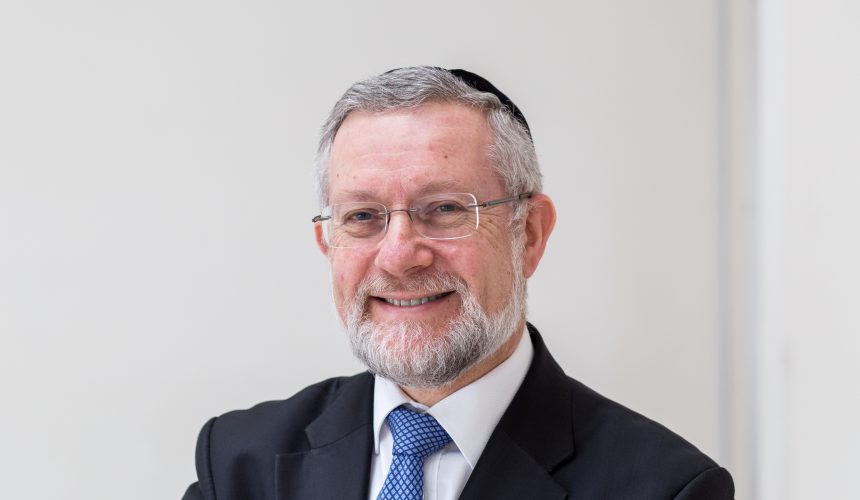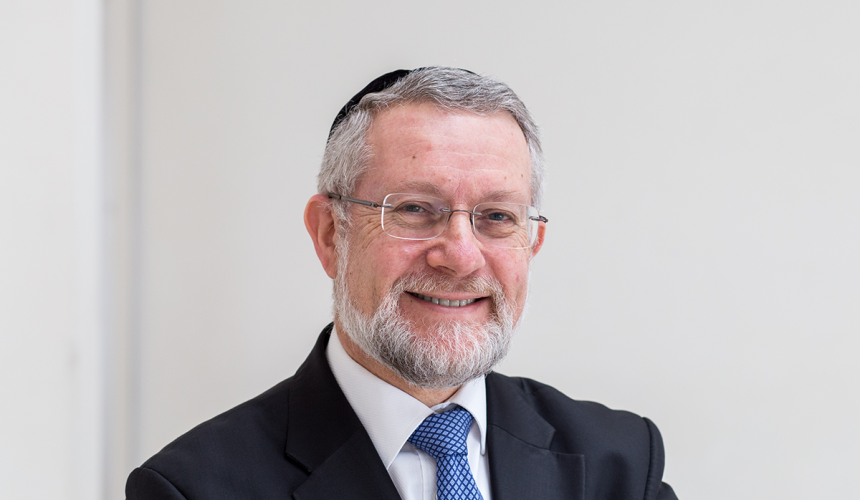TAKING RISKS The temptation to get that perfect selfie can have tragic consequences. More than 250 people have lost their lives picturing themselves at a toxic lake in Siberia. The Torah’s advice is enunciated in a verse in this week’s portion: Venishmartem me’od lenafshoteichem, which Rav Hirsch translates as: “You shall take very good care of yourselves.” [Devarim 4:15] Later in the Torah, in parshat Ki Teitzei, we will read of the requirement to build a fence or a parapet for the roof of a house that is accessible for use. Our Sages extended this commandment to all cases of...
Devarim

FATHER OF MERCY This Shabbat we will be reciting an extra prayer before Ashrei called Av Harachamim “Father of Mercy.” Its origins lie in the wake of the First Crusade. Many Jewish communities in Germany were decimated as mobs found an outlet for their religious zeal in killing Jews before making their way to the Holy Land to wrest it from the Muslims. Thousands of men, women and children lost their lives in the communities of the Rhineland. Mainz, Worms, Speyer were ravaged over the course of a few weeks as the Crusaders made their way down Europe. Most of...
Mattot-Masei

FLATTERY The recent announcement that the US Justice Department is reinstating the death penalty after a sixteen-year break has reopened the debate about the place of capital punishment in a modern democracy. The Torah prescribes capital punishment in principle for a number of transgressions. In practice, however, it was extremely rarely implemented, as severe conditions were required to be fulfilled before it could be applied. Nevertheless, the severity of the offence committed was, in no way, denied. The Torah specifies in this week’s portion that it was not an option to accept blood-money in lieu of a punishment to the...
Pinchas

JOSEPH’S GIFT Rachie and I recently returned from a visit to Israel where we had a chance to visit some of the excavations around the southern wall of the Temple Mount. We saw the replica of the cornerstone of the southern wall, which bears the inscription that this was the place where a Cohen would stand, and sound the shofar or trumpet to announce the pending arrival of Shabbat. Shabbat in the Temple was characterized by an extra sacrifice, over and above the regular daily sacrifices. It is described in this week’s portion, known as Musaf. This is reflected, today,...
Balak

CAN A DONKEY SIN? The episode of the talking donkey in this week’s portion reads more like an excerpt from a fairy tale than a passage from the bible. Yet it draws our attention to a fundamental teaching of Jewish philosophy. When the donkey speaks to Bilaam she says: “What have I done to you that you have struck me these three times? (Bamidbar 22:28) Bilaam replies: “Because you mocked me. If I would have a sword in my hand I would kill you!” (ibid. 29) The Midrash portrays the response the donkey must have given to Bilaam: “You have...
Chukat

SPARE THE ROD In the fortieth year of their wandering in the desert, the Israelites arrive at Kadesh. They have no water to drink and they complain to Moses. G-d tells Moses to take the staff and speak to the rock. Instead, Moses strikes the rock. Although abundant water miraculously pours forth, Moses is severely criticized by G-d for failing to sanctify Him before the people. He is told that, as a result of this transgression, he will forfeit the right to take the people into the land of Israel. The incident is widely debated and analysed by the commentators...
Korach

WHO IS HOLY? When Korach makes a bid to be leader of the Jewish people, he doesn’t assert that he is wiser, richer or more powerful than Moses. He simply says: “All the community are holy. What right do you have to assert yourself over the rest of us?” (Bemidbar 16: 3.) In one sense, Korach is right. We are described as a holy nation. As members of the Jewish people, we each share in that intrinsic holiness. If that is the case, then it is wrong for one individual or group of individuals to have unelected rights over all...
Shelach Lecha

CATCH 22? The recent TV adaptation of Catch 22 is receiving good reviews. Joseph Heller, in his original 1961 novel, coined the term, Catch 22, to refer to a paradoxical situation where a person can’t escape because of contradictory limitations. The phrase very quickly entered public discourse. Moses is faced with a Catch 22 situation at the beginning of the sidra. The Children of Israel are advancing to the Promised Land. As is apparent from the account in Devarim 1:22, they approach Moses with the request that they send out spies to reconnoitre the land. Moses is faced with a...
Beha’alotecha

THE SEVEN BOOKS OF MOSES This week, we are into Beha’alotcha, the third sidra of the fourth book of the Torah, the book of Numbers or Bemidbar. Yet there is a passage in the Talmud (Shabbat 116a) that states that there are not just five books of the Torah, but seven. The extra two are found in this week’s sidra. If you look inside a Sefer Torah, you will see that two verses, 10:35-36, are enclosed by two inverted nuns. The verses are very familiar. They are said whenever the Ark is opened to take out the Sefer Torah and...
Naso

WAGON WISDOM With the race now on to see who will become the next leader of the Conservative Part and the next Prime Minister, the challenge for every candidate will be how to unite the party and the country and to heal the wounds of the Brexit campaign. The words of Abraham Lincoln in his Second Inaugural (quoted by Rabbi Lord Sacks in his recent Newsnight interview) are particularly pertinent: “With malice toward none; with charity for all; …let us strive on to finish the work we are in; to bind up the nation’s wounds…” A powerful symbolic message emerges...

